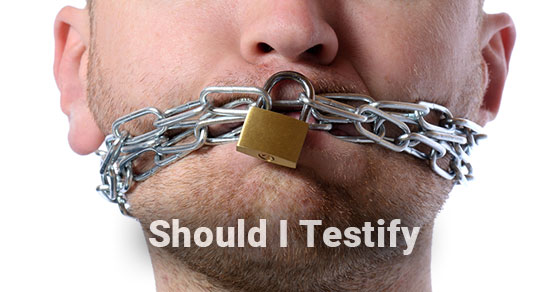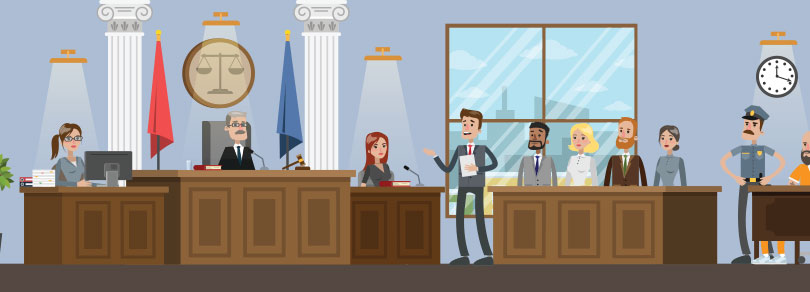Should I Testify? Can I Be Forced to Testify?

Blog by Cassandra Beaulac and Arun S. Maini
You are facing trial on a criminal charge. Can you be forced to testify? Should you testify?
Can I Be Forced to Testify?
The short answer is No, you cannot be forced to testify. Under the Charter of Rights, you cannot be forced to testify at your own trial. You have the right to choose whether to testify in your own defence or not. This is a critical right, because in a criminal case, the Crown has to prove the case against you, and they cannot force you into the witness box to try to incriminate you.
This protection is guaranteed by section 11(c) of the Charter, which provides that “any person charged with an offence has the right not to be compelled to be a witness in proceedings against that person in respect of that offence.” In other words, those accused of crimes cannot be forced by the prosecution, or the court to testify at their own trial. This Charter rightis closely related to the right to remain silent under section 7 (the right to the life, liberty and security of the person) and section 13, which enshrines the right against self-incrimination.
Three important conditions must be met to fall within the scope of protection:
- First, a person must be compelled to be a witness, for example by way of a court order or a subpoena.
- Second, the proceedings must be against that compelled person. That means that if you are a witness in a case against someone else, you cannot claim the protection and refuse to testify. If you and another person are charged separately, even if it is for the same incident, like a robbery for example, then the Crown can force you to testify at the other guy’s trial or preliminary hearing. But they can’t use your answers against you at your own trial.
- Third, those proceedings must be respect to the offence charged against that compelled person. In other words, if you are criminally charged with drunk driving causing death, you cannot be forced to testify at your criminal trial. But you can be forced to testify in a civil lawsuit against you, at a trial or a discovery hearing.
One exception is this: if you are in a joint trial with another person, that other person can force you to testify. The Crown can’t but the other defendant can. That can set up a situation involving a “cut-throat” defence, where the defendants try to get out of trouble by blaming the other. This often does not end well for either party.
Also, this protection prevents compelled testimony; it does not protect against seizures of bodily substances like DNA or breath samples.
Should I Testify?
Just because the government cannot force you to testify doesn’t mean that you shouldn’t. Your lawyer will advise you. If you have evidence that could undermine or neutralize the Crown’s case against you, it might be a very good idea to testify, because it may help to raise a “reasonable” doubt in the mind of the judge or jury.
In some cases, where credibility is essential, as in a sexual assault or domestic assault case, choosing not to testify can be fatal. Unless you can counter the evidence of the complainant with your own version of events, or unless your lawyer has severely undermined the believability of the complainant, it might be very difficult for the judge or jury to find in your favour. Especially with a jury, which decides cases based on common-sense and experience, it might be hard for them to find you Not Guilty if you have not given them your side of the story. They might think you are hiding something, especially when the complainant has testified, or when the case against you is strong. Even when the judge reminds the jury that you don’t have to prove anything, human nature does not like a vacuum, and it may be hard to avoid concluding that you are hiding something.
On the other hand, maybe you do have something to hide. Maybe you did commit the offence. Maybe you have a criminal record which would be revealed if you testify, and which might poison the jury against you. Maybe some of the things you would have to say, or the questions you would have to answer when the Crown is cross-examining you, might cause more harm than good and undermine the progress your lawyer has made so far against the government’s evidence.
In situations where the defence has damaged the Crown’s case, it might not be necessary for you to testify, and to do so might even backfire by putting the spotlight on you instead of on the flaws in the government’s case. Those situations are very difficult, and deciding whether or not to testify can be the most critical decision of the whole case. You need a lawyer with experience to help you navigate your way through such a situation.
In our view, a client’s testimony is essential in most cases, and should be withheld only in rare instances where the risk outweighs the benefits. But there are exceptions, such as an “identity” case where the government simply does not have enough evidence to prove that the photograph or video or voice recording is you. Testifying can end up helping the Crown fill in the gaps in their evidence.
Whether or not to testify is often the most difficult decision to make in a criminal case. And just as you would not decide for yourself whether or how to perform a life-and-death surgical procedure without all of the facts and advice of your doctor, you should not be making assumptions about whether to testify without your lawyer’s advice.
If you are facing criminal charges and need the advice of an experienced and skilled lawyer to help you through the legal process, contact us for a free consultation at 877-295-2830.
Cassandra Beaulac is a recent graduate of the University of Windsor Law School
Arun S. Maini is a criminal lawyer and former prosecutor with over 20 years of experience.


